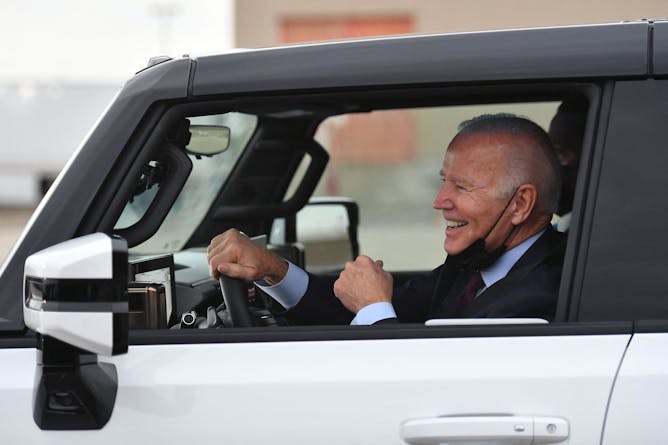|
It’s been a year since President Joe Biden signed the Inflation Reduction Act, and the landmark climate law appears to be working – at least for the U.S. Plans for new battery and electric-vehicle factories are creating tens of thousands of jobs across the supply chain and more than US$100 billion in industry investments on U.S. soil.
But to get those quick wins, U.S. lawmakers likely broke international trade rules. More than that, they may have broken the system, a team of energy and climate policy researchers write.
Rather than ignoring the risk that its buy-American rules will now accelerate trade barriers and protectionist policies around the globe, the U.S. has an opportunity – and arguably a responsibility – to lead the way in fixing old global trade rules to more effectively deal with climate change, write Noah Kaufman, Chris Bataille, Gautam Jain and Sagatom Saha.
|

|
Stacy Morford
Environment + Climate Editor, The Conversation U.S.
|
|

Noah Kaufman, Columbia University; Chris Bataille, Columbia University; Gautam Jain, Columbia University; Sagatom Saha, Columbia University
Joe Biden’s ‘buy American’ effort with EVs likely violated World Trade Organization rules that the US helped create. The US has an opportunity now to update the system – if it’s willing to take it.
|
|
|
|
|
Marketing
|
-
Abhisek Kuanr, University of Essex; Debasis Pradhan, XLRI Xavier School of Management
Fake social media campaigns can negatively affect both influencers and brands.
|
|
Economy
|
-
Steve Schifferes, City, University of London
The world’s central banks face a range of dilemmas, not least whether high inflation – and therefore high interest rates – will become permanent.
|
|
Personal finance
|
-
Nicholas Ryder, Cardiff University; Henry Hillman, University of Reading; Sam Bourton, University of the West of England
Higher education institutions are not explicitly included within the UK’s anti-money laundering regulations.
-
Ylva Baeckstrom, King's College London
Girl math shoppers are showing mastery of portfolio management.
|
|
Environment
|
-
Christian de Perthuis, Université Paris Dauphine – PSL; Édouard Civel, Université Paris Dauphine – PSL
Any smart climate strategy will need to simultaneously move away from fossil fuels and protect biodiversity, including through carbon sink preservation and a shift toward sustainable agriculture.
|
|
Agriculture
|
-
Johann Kirsten, Stellenbosch University
The South African government must act on the ineffective and politics-ridden system of land leases and ensure that beneficiaries are getting secure land rights.
|
|
Consumers
|
-
Vishal Mehrotra, Bond University; Rajat Roy, Bond University
In a landmark case for the Australian automotive industry, the Federal Court has ruled Mercedes-Benz is free to set fixed prices and sell direct to customers, rather than let dealerships haggle.
|
|
|
|
More from The Conversation |
|---|
| |
|
| |
| |
| |
| |
|
|